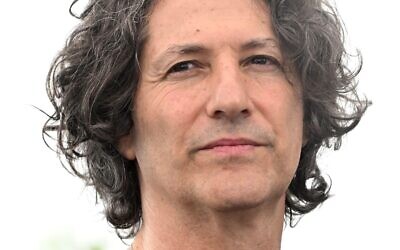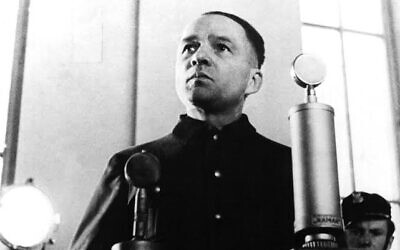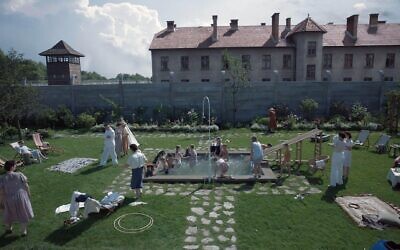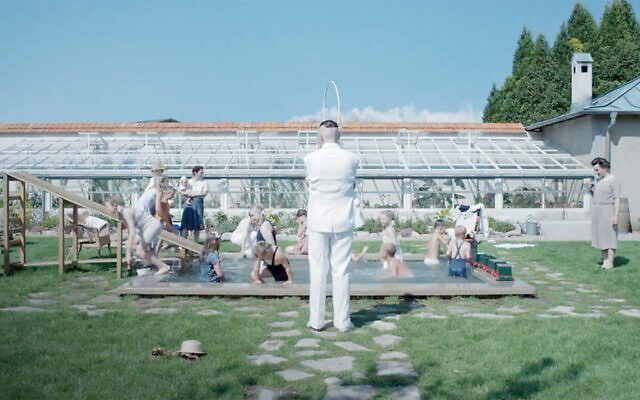FILM REVIEW: The twilight zone between evil and ignorance
Our capacity to ignore what’s under our nose if it offends our eyes and ears – if it lies outside our zone of interest – is tested to breaking point and beyond in Jonathan Glazer’s unflinching new film about the commandant of Auschwitz, writes Richard Ferrer
Richard Ferrer has been editor of Jewish News since 2009. As one of Britain's leading Jewish voices he writes for The Times, Independent, New Statesman and many other titles. Richard previously worked at the Daily Mail, Daily Mirror, edited the Boston Jewish Advocate and created the Channel 4 TV series Jewish Mum Of The Year.
The Zone Of Interest
5/5
Our house has subsidence. It’s bang, bang, BANG from dawn ’til dusk as the builders fix wonky floors, leaky pipes and cracked walls. Working from home, I’ve nailed the knack of tuning out the din to the point where, writing this, I’m more attuned to the dull tap-tap-tap on my keyboard than deafening drill-clank-thud all around.
Our ability to be consciously blind to what’s under our noses if it offends our eyes and ears – if it lies outside of our zone of interest – is pushed to its limits in Jonathan Glazer’s unflinching new film.
Childhood sweethearts Rudolph (played by Christian Friedel) and Hedwig Höess (Sandra Hüller) and their five carefree children live “the life we’ve always wanted”, waited on hand and foot in a palatial home with a manicured garden, replete with a greenhouse and swimming pool. Theirs is truly a life of domestic bliss.
There’s just one hitch: location, location, location. The Höesses live next door to hell. On the other side of the barbed-wired garden wall lies Auschwitz, where Rudolph commutes to work each morning as its remorselessly efficient commandant.
One side is fragrant with lilacs and resonates with the children’s laughter, the other reeks of burning flesh and echoes with the cacophony of gunfire and screams. The physical distance between the two is a mere metre, yet Olympian feats of mental acrobatics extend the psychological distance to infinity.

Lightly based on Martin Amis’ mesmerising 2014 novel of the same name, The Zone Of Interest is a spine-chilling psychoanalysis of a doting father who tenderly tucks his children into bed and warmly bids them farewell each morning, before clocking in for another shift as overseer of Auschwitz.
“When I first visited Auschwitz, I was struck by the proximity of the Hoess house,” British director Jonathan Glazer, who has been nominated for the best director Oscar for the film, told an audience at a preview screening at the Weiner Holocaust Library. “I saw the wall from the garden and camp sides. The prisoners would have heard the Hoess children enjoying summer days splashing around in the pool on the other side of the wall. The wall crystallised for me how we should tell this story.”
The horrors beyond the garden wall are expressed only through sound. Howling; screaming; barking. Gunfire; officers’ orders; the roar of the crematoria.
The film begins with an oppressive two-minute black screen, accompanied by haunting choral music – a technique reminiscent of Steven Spielberg’s transition from colour to black and white at the start of Schindler’s List that drags the audience kicking and screaming into the director’s dystopia. The soundtrack is slowly punctuated by the gentle chirping of birds before the blackness relents to reveal a tranquil riverside scene – the Höess family basking in the summer sun.

“Nettles! Be careful,” Hedwig caringly cautions her children, as they make their way back home. Heaven forbid one might suffer a nasty rash. The matriarch who takes great pride in her nickname “The Queen of Auschwitz” is a devoted mother.
Hedwig’s mother comes to stay, sharing her concern for the well-being of a fellow passenger she saw faint on the train. Later, Hedwig advises her to wrap up warmly to endure the harsh winter in Oświęcim. Rudolf takes one of his sons for a horse ride as the distant cries of prisoners echo in the background. The curious child turns to his father and asks, “Did you hear that…? It’s a grey heron.”
The Hösses, like their neighbours, live in captivity, prisoners of their own delusion.
The children excitedly wave their father off on his short commute to work (“Bye-bye, daddy!”), leaving Hedwig to tend to her beloved garden. She proudly shows her mother the rosemary, beetroot, fennel and sunflowers blossoming in all corners, nourished by human ash. Her mother nods approvingly at her daughter’s tranquil oasis, then glances at the wall and wonders aloud: ‘Maybe Esther Silberman is over there. The one I used to clean for.”

At night, smoke billowing from the crematorium chimneys casts a haunting orange glow through the children’s bedroom windows, shrouding the house in demonic ambience. “The horror is the house,” says Glazer. “Fascism starts in the family. It’s not even that they are disassociated from the atrocities. It just feels so normal to them.”
When Rudolph tells his Hedwig he’s been promoted and they must return to Germany, she’s inconsolable. “We are living beyond our dreams!” she protests. “They’ll have to drag me out of here!”
In the film’s most poignant sequence, notable for a glimpse of human kindness, Glazer uses a thermal imaging camera to show a Polish girl out on her bike at night, hiding apples in piles of dirt for the prisoners to find the next morning. The scene was inspired by a meeting Glazer had with the heroine it portrays.
“There were plenty of times I told my wife I just couldn’t go on with this film any longer. There was just too much darkness to deal with,” he recalls. “Then I met this woman. She’s now 90 but was 14 at the time, living near the camp. She spent her nights riding to the slave labour sites just outside the camp’s perimeter where the prisoners worked to leave them apples. She became very important to me and the film. She’s there to remind the audience that, despite everything, there is a little light.”
“The horror is the house,” says Glazer. “Fascism starts in the family. It’s not even that they are disassociated from the atrocities. It just feels so normal to them.
Remarkably, this is a Holocaust film without the Holocaust. We don’t witness the persecution, ghettos, gas chambers or, indeed, a single Jew. The horrors beyond the garden wall are expressed only through sound. Howling; screaming; barking. Gunfire; officers’ orders; the roar of the crematoria. Piercing, curdling noises so vivid, so intense, they sound visible.
“It didn’t feel right to re-enact the atrocities,” says Glazer. “The archive footage, after all, is seared into our minds. I couldn’t see a way of making this film conventionally, using modern cinema in all its glory. That would have glamorised and empowered the subjects on the screen. I wanted the audience to see them for who they were, not get wrapped up in the screen psychology of an actor pretending to be a character. I needed to believe in who they were. That felt important.
“I didn’t want to present them as cinematic monsters and villains, because then we wouldn’t see ourselves in them. There is no story arc for these people. There’s no salvation, no redemption. We simply see them for who they are.”
The Zone Of Interest is released in cinemas on 2 February


Thank you for helping to make Jewish News the leading source of news and opinion for the UK Jewish community. Today we're asking for your invaluable help to continue putting our community first in everything we do.
For as little as £5 a month you can help sustain the vital work we do in celebrating and standing up for Jewish life in Britain.
Jewish News holds our community together and keeps us connected. Like a synagogue, it’s where people turn to feel part of something bigger. It also proudly shows the rest of Britain the vibrancy and rich culture of modern Jewish life.
You can make a quick and easy one-off or monthly contribution of £5, £10, £20 or any other sum you’re comfortable with.
100% of your donation will help us continue celebrating our community, in all its dynamic diversity...
Engaging
Being a community platform means so much more than producing a newspaper and website. One of our proudest roles is media partnering with our invaluable charities to amplify the outstanding work they do to help us all.
Celebrating
There’s no shortage of oys in the world but Jewish News takes every opportunity to celebrate the joys too, through projects like Night of Heroes, 40 Under 40 and other compelling countdowns that make the community kvell with pride.
Pioneering
In the first collaboration between media outlets from different faiths, Jewish News worked with British Muslim TV and Church Times to produce a list of young activists leading the way on interfaith understanding.
Campaigning
Royal Mail issued a stamp honouring Holocaust hero Sir Nicholas Winton after a Jewish News campaign attracted more than 100,000 backers. Jewish Newsalso produces special editions of the paper highlighting pressing issues including mental health and Holocaust remembrance.
Easy access
In an age when news is readily accessible, Jewish News provides high-quality content free online and offline, removing any financial barriers to connecting people.
Voice of our community to wider society
The Jewish News team regularly appears on TV, radio and on the pages of the national press to comment on stories about the Jewish community. Easy access to the paper on the streets of London also means Jewish News provides an invaluable window into the community for the country at large.
We hope you agree all this is worth preserving.






















